For those of you whoare preparing to travel to Singapore to startyourEPcareerduring the National Day holiday, every aspect before entering the country should not be overlooked:
From visa application toIPAapproval letter, baggage packing,SG Arrival Carddeclaration, customs clearance, phone card application, health checkups and legal and cultural taboos, etc., all of them may be hidden “stepping on pitfalls” traps.
We have prepared a detailed Immigration Checklist for you, which is centered on the four major sections of visa application and compliance requirements, baggage and customs clearance, e-Arrival card and phone card application, and arrival formalities and health check, to help you comprehensively sort out the necessary matters prior to your arrival, so as to ensure a smooth arrival and a peaceful start to the good life in the Lion City.
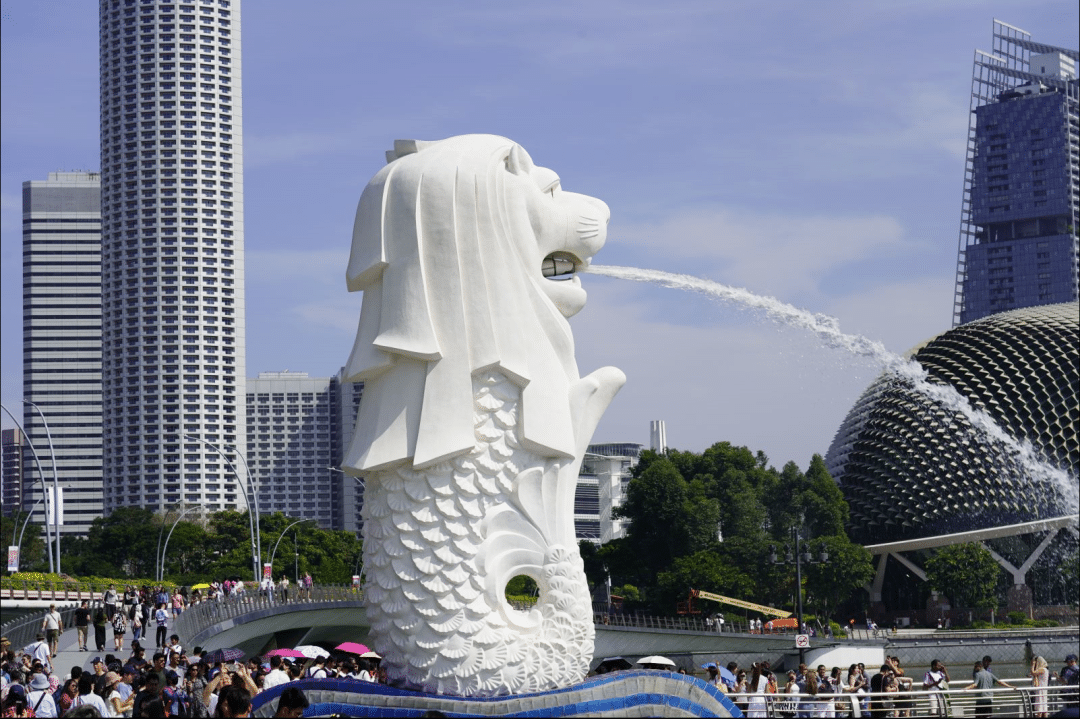
Photo/Singapore Fishtail Lion

I.Application and Compliance Requirements for EP and Other Permits
Under the MOM’s Fair Consideration Framework, employersare required topost job vacanciesonMyCareersFuturefor at least14daysbeforeapplying forthe EP Employment Passto ensure that local job seekers are given equal opportunities.
The subject of the application must be a Singapore registered company or an overseas organization through a local sponsor; individuals cannot submit directly.
EPapplications are assessed using a two-stage eligibility assessment. Stage 1 is the wage benchmark:
The minimum monthly salary for non-financial services applicantsis S$5,600and for financial servicesapplicantsisS$6,200, and increases with age toa maximum ofS$10,700andS$11,800respectively for those aged45and above. If the monthly salary is not met, the application will be rejected outright.
Stage 2 is aCOMPASSpoint system that requires applicants to accumulate a minimum of40points, with a few exemptions, on scoring dimensions such as wage alignment, proof of qualifications, diversity, local employment support, skills shortage bonus points and strategic economic priority bonus points. Employers cansimulate scores in advanceusingMOM‘s self-service assessment tools, SATandWorkforce Insights.
Upon approval ofthe EP, MOM will issueanIn-Principle Approval(IPA) letterto the employerand the applicant mustenter the countrywith theIPAletterwithin6 monthsfrom the date of issue.
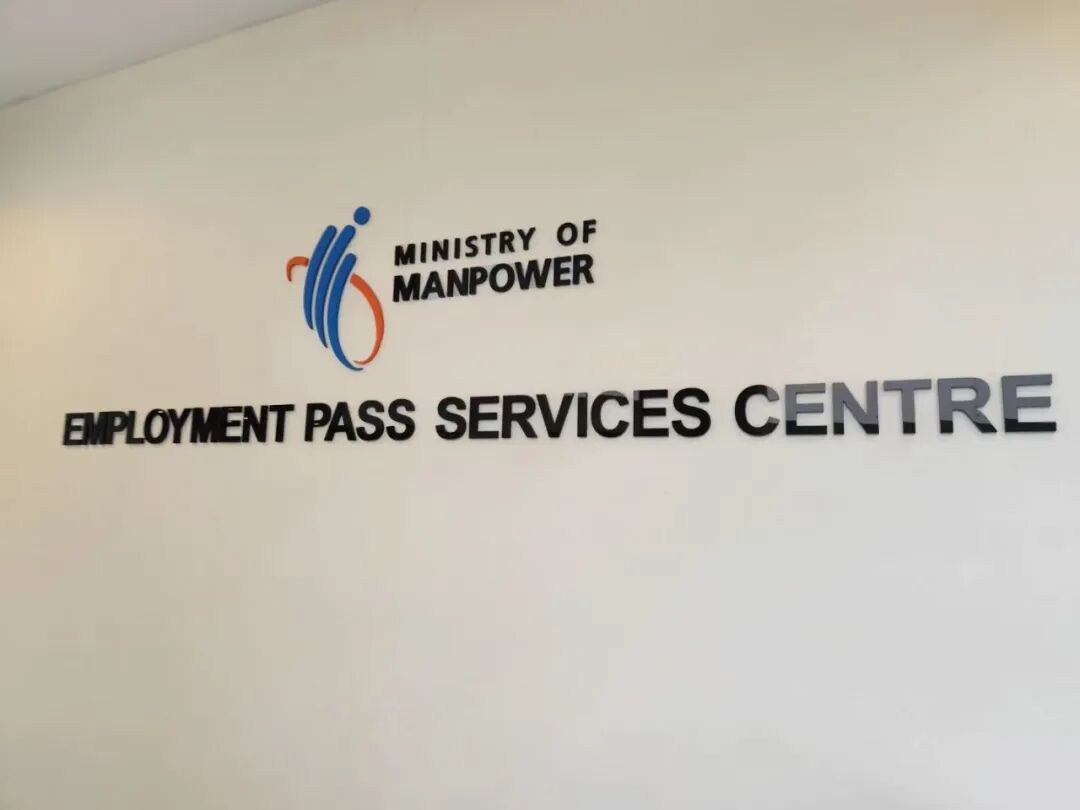
Photo/Singapore MOM
After entering the country, you also need to make an online appointment to record your fingerprints and photos, and you can collect yourEPcardat the designated address within 5 working days after completion.If you do not enter the country within the validity period or do not complete the fingerprint enrollment,the IPAwill automatically expire and you need to reapply.
EPholders are not required to pay foreign labor tax or subject to quota restrictions, and can be granted a maximumvalidityof 2 years forthe first time, and a maximum of3years forrenewal; those who are experienced and have skills in short supply can be granted a maximum of5years ofEP.EPcards that have been lost, damaged, or changed must bereissued or renewed onlinethrougheService.
EPholderswitha monthly salary ofS$6,000canapply for aDependant‘s Passfor their spouses andunmarried childrenunderthe age of21; and with a monthly salary ofS$12,000, they can also apply for a Long-Term Visitor’s Pass (LTVP)for their parents, who can apply for a separate work permit.
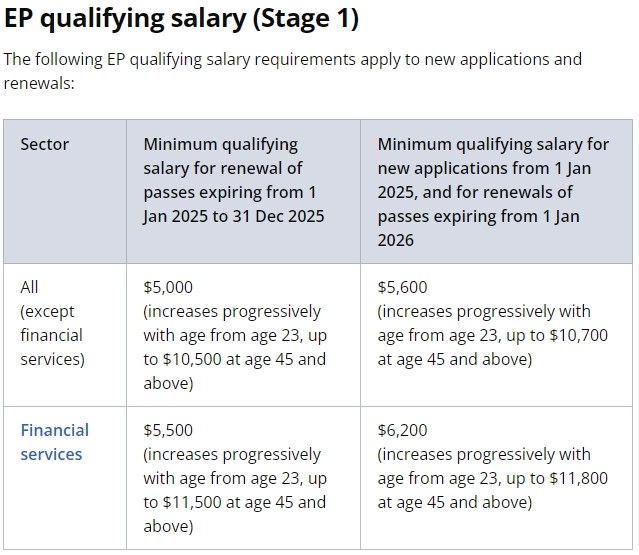
Photo/from MOM

II. Baggage Preparation and Customs Clearance
When packing, the documents to be prepared include passport (valid for at least6months), printing of multiple copies ofthe IPAletter, work contract, vaccination certificate (in English and Chinese), ID photos with white background (at least five), ID card and photocopies.
Electronic devices are recommended to bring full network pass cell phones, laptops, British standard converter plugs, charging treasure and headphones, domestic contract phones may not be compatible with the local network.
Summer clothing is the mainstay of your life, with a thin jacket and commonly used over-the-counter medicines; please do not bring Chinese herbal medicines. It is advisable to carrybetweenS$500andS$1,000in cash, and overS$20,000must be declared to the Customs and Excise Department, as well as a bank card with low cash withdrawal fees.
Singapore Customs has red and green channels. The green channel is for items that do not need to be declared, while the red channel is for taxable, regulated or embargoed items, such as excess tobacco, alcohol, controlled drugs, pirated publications, etc., which must be declared voluntarily or face hefty fines or confiscation.
Tobacco products can only be brought in1carton of cigarettes or50cigars duty-free, and any excess amount must be declared and taxed;
Alcoholcan be carriedduty-freeina combination of1liter of spirits and1liter of wine or2liters of beer,provided that the alcohol has been outside the country for at least48hoursprior to arrivaland is not entering from Malaysia;
Carryingcash, traveler’s checks or liquid financial instrumentswith an equivalent value ofmore than SGD20,000must bedeclaredon theSG Arrival Cardor a fine will be imposed.
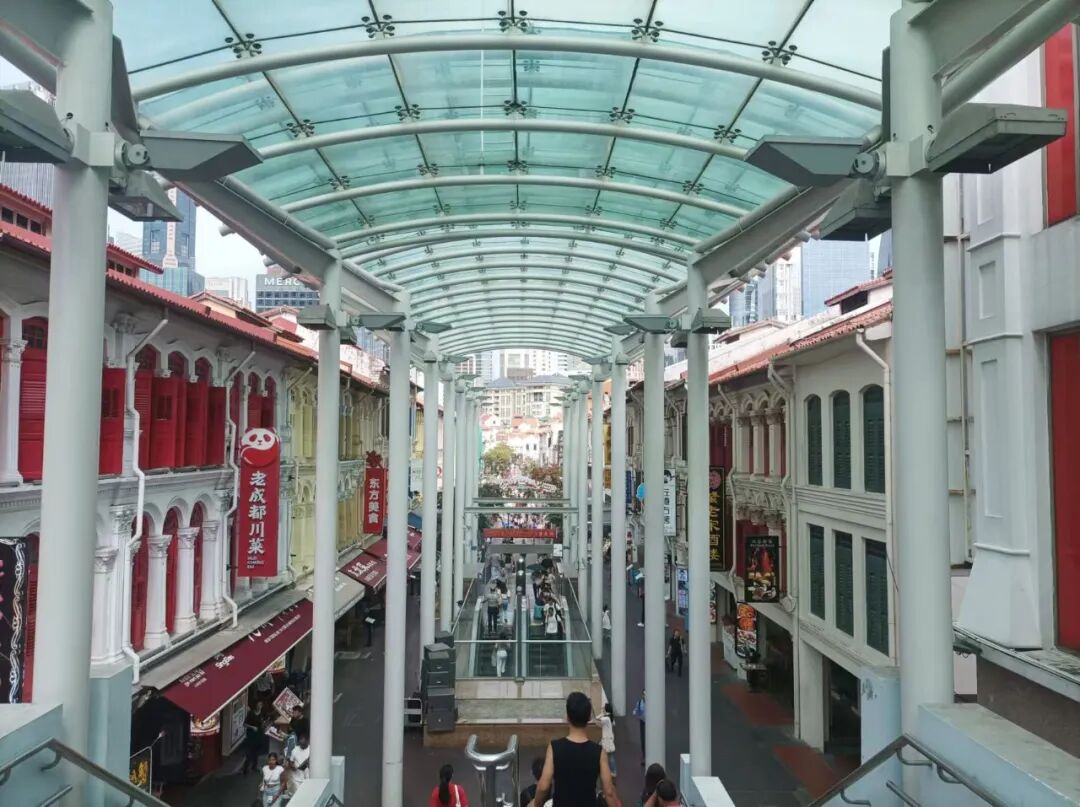
Photo/Singapore Chinatown

III.SG Arrival CardDeclaration and Phone Card Processing
All arrivals must submit theSG Arrival Card(e-Arrival Card)online no later than three days prior to arrival, filling in personal information, travel details, health declaration and declaration of carry-on items, and presenting it in the form of a QR code. Those who fail to make the declaration on time will be asked to make a replacement on site, which may cause delays in customs clearance.
Pre-paid or post-paid phone cards can be purchased at Changi Airport’s Arrival Hall, convenience stores and major shopping malls in the city. Passport andIPAletterare required for processing.
Prepaid cards do not require a credit check and can be used as soon as they are topped up; postpaid contract cards are suitable for long-term residents but require a credit check. To avoid network incompatibility, it is recommended to choose an all-network cell phone and activate domestic and international roaming in advance.
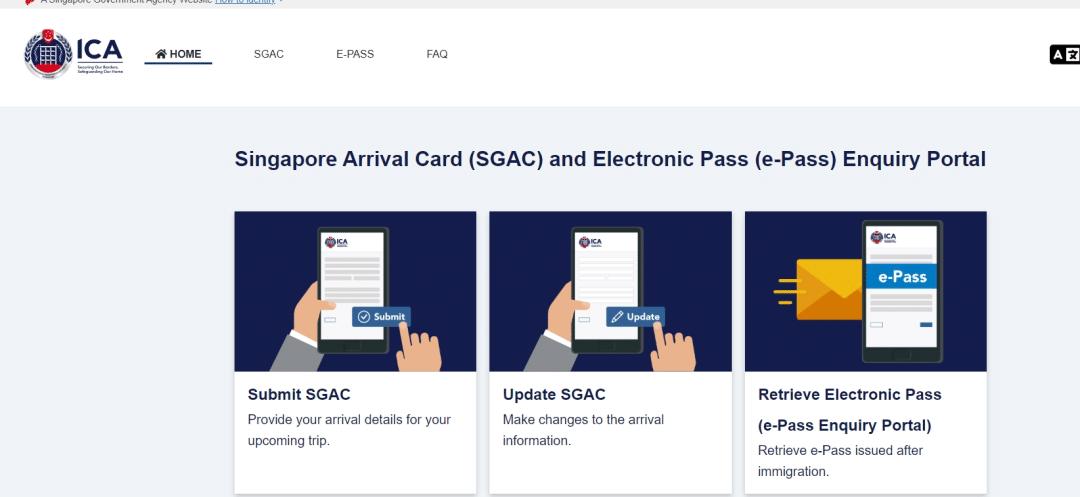
Photo/from ICA

IV. Arrival formalities and health checks
Upon arrival, complete theSG Arrival Carddeclaration and customs inspection, andmake an online appointment to have your fingerprints and photographs takenasinstructed in theIPAletter.The EPcard will be mailed to your designated address in Singaporewithin five working days after completion of the registration process, be sure to check the card face when signing for the card.
EPholders who have stayed in Singapore for more than 6 months are required to complete a TB screening (chest X-ray) and a general medical examination at a designated medical institution;
Some industries such as food and education have additional programs that are arranged by employers. Although MOM does not mandate employers totake out medical insuranceforEPholders, it is recommended to check with employers on the coverage or take out a supplementary international medical insurance policy on your own.
Eating durian and spitting are prohibited in public places in Singapore, and violators will face cleaning fees or fines; queuing, garbage disposal and other public order are also strictly regulated. Do as the Romans do and respect local laws and culture to avoid unnecessary trouble and fines.
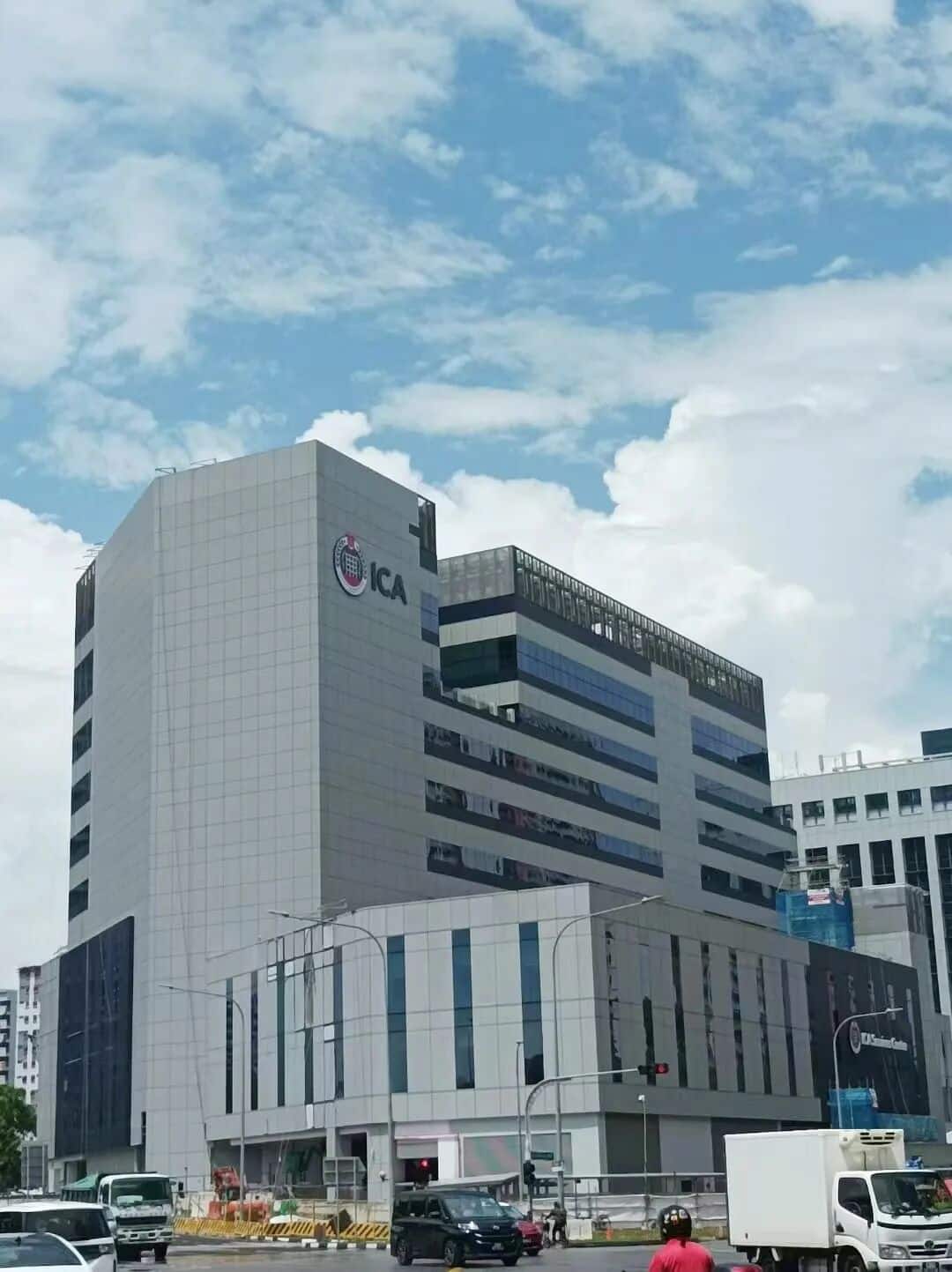
Photo/Singapore ICA
[Conclusion]
Pre-entry preparationsfor EPmay seem tedious, but each step of the process is a stepping stone to ensure that your career in Singapore unfolds smoothly.
With everything in place such as visa application and compliance, baggage packing and customs, e-entry card declaration, phone card application, health check and cultural regulations, a newbie can be transformed into a veteran and quickly get into the rhythm of the Lion City.
Last but not least, I wish allEPholders, a smooth journey and a successful work life!
Note:References are fromMOMSingapore,ICA, Lianhe Zaobao, compiled from comprehensive news public reports, reprinted with attribution.
